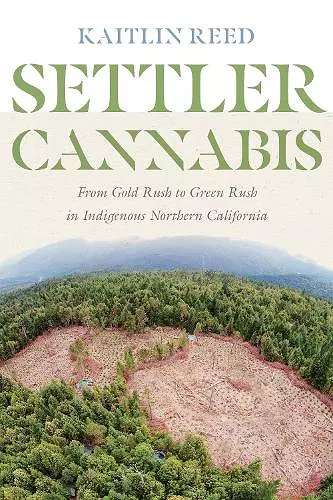Settler Cannabis
From Gold Rush to Green Rush in Indigenous Northern California
Kaitlin P Reed author Coll Thrush editor Charlotte Coté editor
Format:Hardback
Publisher:University of Washington Press
Published:20th Jun '23
Currently unavailable, and unfortunately no date known when it will be back
This hardback is available in another edition too:
- Paperback£23.99(9780295751566)

Connects California cannabis production to the violence and dispossession of Indigenous land and people
Young countercultural back-to-the-land settlers flocked to northwestern California beginning in the 1960s, and by the 1970s, unregulated cannabis production proliferated on Indigenous lands. As of 2021, the California cannabis economy was valued at $3.5 billion. In Settler Cannabis, Kaitlin Reed demonstrates how this "green rush" is only the most recent example of settler colonial resource extraction and wealth accumulation. Situating the cannabis industry within this broader legacy, the author traces patterns of resource rushing—first gold, then timber, then fish, and now cannabis—to reveal the ongoing impacts on Indigenous cultures, lands, waters, and bodies.
Reed shares this history to inform the path toward an alternative future, one that starts with the return of land to Indigenous stewardship and rejects the commodification and control of nature for profit. Combining archival research with testimonies and interviews with tribal members, tribal employees, and settler state employees, Settler Cannabis offers a groundbreaking analysis of the environmental consequences of cannabis cultivation that foregrounds Indigenous voices, experiences, and histories.
"This book may interest a variety of audiences as it covers topics such as environmentalism, Indigenous history, decolonization, California history, and more. It is an important inclusion in the current scholarship, but it is also important for a broader audience as it shows the steps forward for a better future in a time where we have no choice but to make changes to survive."
* Western Historical Quarterly *"Brilliant and meticulously researched. . . Settler Cannabis is an impressive exploration of settler colonialism's impact on Indigenous lands, waters, and human and nonhuman kin, and [Reed's] focus on expanding ideological constructs of genocide remains centered on Indigenous futures."
* H-Environment *"[S]hatters the illusory "green idyll" mythology hiding behind the Redwood Curtain in the cannabis-laden watersheds of Northern California. . . Dr.Reed's work is groundbreaking, in the tradition of academic historians preceding her, like Howard Zinn. Zinn's A People’s History of the United States and Reed's Settler Cannabis both expose the state-sanctioned genocide of New World People and Native Americans."
* EcoLit Books *"Reed presents the views of many Indigenous People, sets the record straight regarding the history of California, and suggests a realistic future for Indigenous People in the state of California. . . This book will give an intense yet truthful course on the state of California and how events bleed into one another because of settler colonialism. The book is a strong addition to the historiography of Indigenous history and will be a great source to use in both high school and college courses."
-- Gabrielle Velázquez * History in the Making *"A virtually unexplored perspective that needs to be examined. . . While Reed speaks about potentially controversial topics others are unwilling to acknowledge and discuss, she leaves the reader with an accurate portrayal of California Indigenous history, a wealth of knowledge, and hope for the future. She fills in the gaps of the forgotten, potentially erased, and otherwise untold history of California."
* News from Native California *"Although the book focuses on the experiences of Native Americans in California, it contains insight that will enrich and inform any reader interested in natural resources."
* Natural Resources Journal *"[Reed] compellingly writes about California's violent history while prioritizing Indigenous voices and perspectives. This is only possible because of her fantastic prose and storytelling. Scholars and students interested in how extractive violence shapes Indigenous bodies and lands should read Settler Cannabis."
-- Labriola Center American Indian National Book Award commi- Winner of Labriola Center American Indian National Book Award 2024 (United States)
ISBN: 9780295751559
Dimensions: unknown
Weight: 623g
308 pages